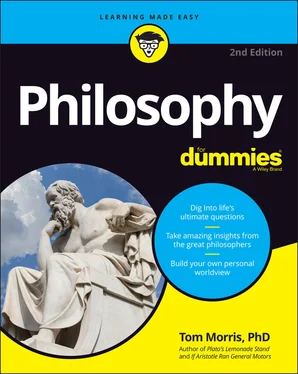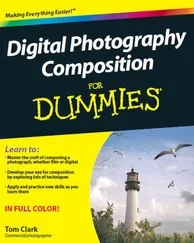Tom Morris - Philosophy For Dummies
Здесь есть возможность читать онлайн «Tom Morris - Philosophy For Dummies» — ознакомительный отрывок электронной книги совершенно бесплатно, а после прочтения отрывка купить полную версию. В некоторых случаях можно слушать аудио, скачать через торрент в формате fb2 и присутствует краткое содержание. Жанр: unrecognised, на английском языке. Описание произведения, (предисловие) а так же отзывы посетителей доступны на портале библиотеки ЛибКат.
- Название:Philosophy For Dummies
- Автор:
- Жанр:
- Год:неизвестен
- ISBN:нет данных
- Рейтинг книги:4 / 5. Голосов: 1
-
Избранное:Добавить в избранное
- Отзывы:
-
Ваша оценка:
- 80
- 1
- 2
- 3
- 4
- 5
Philosophy For Dummies: краткое содержание, описание и аннотация
Предлагаем к чтению аннотацию, описание, краткое содержание или предисловие (зависит от того, что написал сам автор книги «Philosophy For Dummies»). Если вы не нашли необходимую информацию о книге — напишите в комментариях, мы постараемся отыскать её.
Philosophy For Dummies
Philosophy For Dummies
Philosophy For Dummies — читать онлайн ознакомительный отрывок
Ниже представлен текст книги, разбитый по страницам. Система сохранения места последней прочитанной страницы, позволяет с удобством читать онлайн бесплатно книгу «Philosophy For Dummies», без необходимости каждый раз заново искать на чём Вы остановились. Поставьте закладку, и сможете в любой момент перейти на страницу, на которой закончили чтение.
Интервал:
Закладка:
These questions cover only a few of the basic concepts that I consider with you throughout this book. Ultimately, I hope to help you ask your own questions a little better, or a bit more deeply, and perhaps even come to some revelatory and satisfying answers. As the famous novelist James Thurber once pointed out, “It is better to ask some of the questions than to know all of the answers.” Asking the right questions well, and living with them, can enhance our lives.
Chapter 2
Philosophy as an Activity
IN THIS CHAPTER
 Seeing what philosophy as an activity is
Seeing what philosophy as an activity is
 Finding out how to do philosophy yourself
Finding out how to do philosophy yourself
 Appreciating the power of belief
Appreciating the power of belief
 Peering into Plato’s Cave
Peering into Plato’s Cave
Philosophy is not a theory but an activity.
— Ludwig Wittgenstein (1889–1951)
Philosophy at its best is an activity more than a body of knowledge. In an ancient sense, done right, it’s a healing art. It’s intellectual self-defense. It’s a form of therapy. But it’s also much more. Philosophy is map-making for the soul, cartography for the human journey. It’s an important navigational tool for life that too many modern people try to do without.
In this chapter, we see exactly what that activity is, as well as how to do it well. I show you the power that belief can have in our lives, and I bring you a distinction Plato drew so vividly that it has echoed down the centuries, helping to free people from illusion and lead them into truth.
Adventuring for the Mind
Philosophy can be a little like a version of the wilderness adventure trekking of Outward Bound for the mind: intellectual spelunking, mental rock climbing, cognitive rappelling, rafting, and reconnoitering. Sometimes, it can even seem like a conceptual version of Extreme Sports.
On those occasions when we push philosophical inquiry to the very limits of our world-views, we find ourselves temporarily letting go of our customary assumptions, intellectually free-falling and hoping the chute will open when we need it. Anytime we do this, the point is to experience the outer boundaries and foundations of our ordinary beliefs, to come to understand the status of our most important presuppositions, those background convictions that support the perspectives and decisions governing our day-to-day actions, and that we normally just take for granted.
We question things as deeply as we can in order to understand as deeply as we can. The ultimate goal is a firmer grip on who we are and what our place in the world really is.
But in another light, philosophy can be thought of as a package of existential survival skills, along with the determined application of those skills in a sort of search-and-rescue mission for the soul. Philosophy is not just a game. It’s not simply a mental sport. It is the most vital use of our minds for getting our bearings in life. It may even act as a path for living well.
Mapping Our Way Forward
Consulting the great thinkers of the past, as we draw our own philosophical maps for the present and future, is like stopping to ask a local for directions, rather than just wandering around lost. It’s getting the advice of those who know, people who have been in the neighborhood before and can find their way around. We inevitably do a little exploring of your own, but any good advice and direction we get can help.
In any expedition into unfamiliar terrain, it pays to have a native guide to lead us, but ultimately we all have to pull ourselves up the side of the hill. We partner with the great thinkers who have gone before us and, with their help try to see our own vistas and make our own way.
The American philosopher Ralph Waldo Emerson once wrote these important words that fall short only in referring to just one gender:
Meek young men grow up in libraries, believing it their duties to accept the views which Cicero, which Locke, which Bacon, have given; forgetful that Cicero, Locke, and Bacon were only young men in libraries when they wrote these books.
“Who am I to think about these things?” each of us is tempted to ask. Well, who did Socrates think he was to be tackling such ideas? Who was Plato? In the first century, Seneca wrote,
Philosophy did not find Plato already a nobleman; it made him one.
It’s every bit as much our business to ask questions about the big issues as it was theirs. But because they already started the process, we can benefit from their thinking and enter a conversation that began long ago, perhaps to make our own useful contributions. As the ancient dramatist Menander claimed, “Whoever consorts with the wise will become wise.”
 We consult the writings of the great dead philosophers not for any final word on the ultimate questions of philosophy, but rather to help get us started, using the insights and avoiding the pitfalls already discovered by those who have gone before us. Early in this century, William Ralph Inge explained, “The object of studying philosophy is to know one’s own mind, not other people’s.” So when we are doing philosophy, we go to the books and essays of past thinkers not to take inventory of their thoughts, or to gather up from them all the answers we might want, but, rather, for the assistance and inspiration we need to do our own jobs as thinkers.
We consult the writings of the great dead philosophers not for any final word on the ultimate questions of philosophy, but rather to help get us started, using the insights and avoiding the pitfalls already discovered by those who have gone before us. Early in this century, William Ralph Inge explained, “The object of studying philosophy is to know one’s own mind, not other people’s.” So when we are doing philosophy, we go to the books and essays of past thinkers not to take inventory of their thoughts, or to gather up from them all the answers we might want, but, rather, for the assistance and inspiration we need to do our own jobs as thinkers.
Emerson comments, “Books are the best of things, well used; abused, among the worst. What is the right use? What is the one end which all means go to effect? They are for nothing but to inspire.” I hope in this book to begin to inspire you, as I have been inspired by the books of others, to look into these matters for yourself and fight to attain a bit of your own wisdom for life. Likewise, I’ll be your guide, as I use many guides myself, to make our way forward together.
Understanding the Power of Belief
Let me pass on an important lesson I’ve learned about the role of assumption and belief in our lives. It demonstrates our need for the discipline of philosophy, and in an unusual way.
For a long time, my family had wanted to own a gas grill, the kind that has a fat tank of propane under it. But people had warned me about the dangers of propane gas. It’s really combustible. And, breathed in, they said, it’s seriously toxic. I seemed to remember that I had heard or read somewhere that in its natural state, propane gas is without odor, but that refiners added a smell so that any leaking gas could be detected immediately and avoided.
Socrates wasn’t the only philosopher who enjoyed being involved in a good grilling (Get it? Because he questioned people relentlessly — and if you did get my lame joke, well done!), so when my family offered to get me the long-discussed gas grill for Father’s Day, I agreed with enthusiasm to do my part in making all their charred dreams come true. My wife called a local store and ordered a deluxe model. She also paid to have it assembled and delivered. Philosophers are often not the best at putting together anything but ideas.
Читать дальшеИнтервал:
Закладка:
Похожие книги на «Philosophy For Dummies»
Представляем Вашему вниманию похожие книги на «Philosophy For Dummies» списком для выбора. Мы отобрали схожую по названию и смыслу литературу в надежде предоставить читателям больше вариантов отыскать новые, интересные, ещё непрочитанные произведения.
Обсуждение, отзывы о книге «Philosophy For Dummies» и просто собственные мнения читателей. Оставьте ваши комментарии, напишите, что Вы думаете о произведении, его смысле или главных героях. Укажите что конкретно понравилось, а что нет, и почему Вы так считаете.












